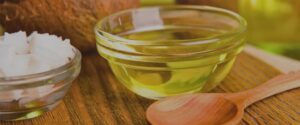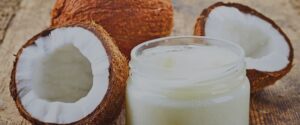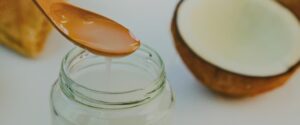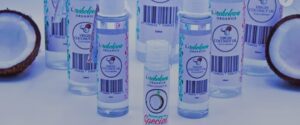The coconut oil obsession is something you can’t prevent. It’s being used in baking. People are spreading it on toast and adding it to their coffee. Coconut oil appears to have many uses!
While keto lovers choose this oil, it does not imply it’s healthier than other types. Keep the saturated fat level in mind when eating or cooking with coconut oil. Coconut oil is heavy in saturated fat, which most research indicates minimizes the diet. According to a study, coconut oil contains 90 percent saturated fat.

While the healthfulness of saturated fat has been questioned, a comprehensive evaluation of 16 clinical studies published in 2020 found that consuming coconut oil raises LDL (“bad”) cholesterol more than nontropical plant oils. As a result, while it may increase HDL, the LDL cholesterol associated with an increased risk of heart disease is also increased.
The American Heart Association advises limiting your daily saturated fat consumption to 13 grams. If you use coconut oil frequently, reaching or surpassing that limit is simple. Furthermore, it leaves little room for additional types of saturated fat in your diet.

According to Tieraona Low Dog, MD, author of Fortify Your Life: Your Guide to Vitamins, Minerals, and More, if you take coconut oil, it should be one of several oils in your meal. So there’s no need to smother everything with it (it does contain 121 calories per tablespoon, about the same as other oils). Instead, mix it up with extra-virgin olive oil, peanut oil, grapeseed oil, and ghee.
However, coconut oil has so many other advantages that even if you use it sparingly, a jar may not last long! Check out these creative ways to utilize coconut oil from head to toe.
- Natural Eczema Treatment

Dr. Low Dog recommends using coconut oil to help control an eczema flare-up.
Scratching might introduce staph bacteria because of irritated skin (Staphylococcus aureus, which requires antibiotics). “Research revealed that using coconut oil daily on your skin for a month resulted in a 95% fall in staph on the skin,” she explains. Coconut oil is high in lauric acid, which contains antibacterial and antifungal properties that help kills dangerous microorganisms. It may also assist in moisturizing the skin, which is your body’s primary line of defense against infection.
- As Treating Acne

Besides the numerous other advantages of coconut oil’s antifungal and antibacterial qualities, a preliminary study suggests it may be “a feasible alternative for people with mild to severe skin infections, particularly acne vulgaris caused by P. acnes.” Coconut oil can clog pores since it is comedogenic, like all other oils. However, research has also shown that it has anti-inflammatory properties, may shield the skin from UV rays, and may improve its natural ability to act as a screen to external irritants. Consult a board-certified dermatologist if you have sensitive skin or are prone to acne before using it.
- As a Moisturizer

Coconut oil works best when applied topically to the skin. With no other smell or other additives that can irritate the skin, coconut oil can be a fantastic natural hydrator. “I’m very into applying it externally.” “The compounds in coconut oil are both efficacious for preserving skin hydration,” says Low Dog. Coconut oil was proven to be equally safe as other oils and significantly increased skin moisture when applied twice daily for two weeks. In addition, coconut oil may be used to soothe itchiness, as well as to minimize the chances of bacterial infections, according to Low Dog. After showering, warm some up in your palms and apply it to your legs, the backs of your arms, and other parts.
- To Improve Oral Health

Oil pulling (swishing oil around in your mouth) is a procedure commonly used with olive oil that has assisted Low Dog’s patients with gum issues or plaque buildup. Coconut oil could also be an excellent option to try.
“There’s some evidence that coconut oil may be advantageous to the oral microbiota and overall oral health,” she explains. According to a 2017 review published in the Journal of Traditional and Complementary Medicine, the advantages may be attributed to lauric acid in coconut oil, which possesses antibacterial and anti-inflammatory characteristics that may help reduce the formation of tooth cavities. According to the analysis, while oil pulling is not a replacement for conventional dental care, it does have certain benefits.
- To improve Vaginal Health

Coconut oil is commonly utilized as a natural lubricant, although there is little scientific research on the subject, according to Low Dog. Using a water-based lubricant in such a situation is better if you’re using coconut oil as a natural lubricant because studies have shown that it can break down latex condoms.
Applying a tiny bit of organic refined coconut oil to a micro pad before the night is one way some women manage vaginal dryness using coconut oil. It nourishes the vagina a lot, according to Low Dog.
- Athlete’s Foot Prevention

Coconut oil’s antifungal components, notably lauric and caprylic acid, may aid in the prevention of various fungal infections, such as athlete’s foot. An initial study has indicated that these chemicals have potential antifungal action, but more research is required to evaluate how medically beneficial they may be in humans. Still, if you go to the gym frequently and are concerned about the athlete’s foot, Low Dog suggests massaging coconut oil into your feet before night. (Be sure to wear socks since it might get greasy.) As an added benefit, smearing coconut oil on your feet will help hydrate them because heels are prone to dry, damaged skin.
- Treatment for Hair

According to a study, using coconut oil before or after washing your hair can reduce protein loss in healthy and damaged hair. The lauric acid in coconut oil may permeate hair proteins to preserve your locks. Use the oil carefully if you don’t want to appear oily (even though your mane will be well moisturized).

Additionally, more recent studies have suggested that coconut oil may help treat dandruff. Coconut oil may benefit the health of the scalp microbiota, according to a 2021 Scientific Reports research (possibly because of its antifungal, antimicrobial properties). Women prone to dandruff showed a rise in microorganisms associated with dandruff after using coconut oil on their scalps. The infrequent coconut oil hair mask won’t hurt, but further study is required.
Summary

No one can overlook the benefits of coconut oil. It is used in cooking, baking, skincare, and disease treatment. However, experts suggest limiting the use of coconut oil because its saturated content affects health.
It is applied to health problems such as athlete’s foot, eczema, vaginal health, and moisturizer. The use of coconut oil cautiously benefits. It is better to apply it with peanut, grapeseed, extra virgin olive oil, and ghee benefits.





